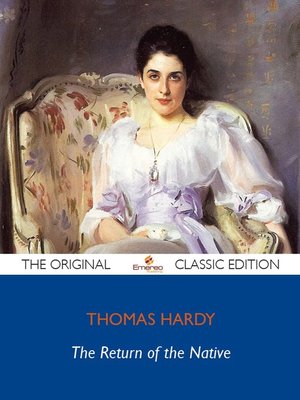The Return of the Native - The Original Classic Edition
ebook

Sign up to save your library
With an OverDrive account, you can save your favorite libraries for at-a-glance information about availability. Find out more about OverDrive accounts.
Find this title in Libby, the library reading app by OverDrive.



Search for a digital library with this title
Title found at these libraries:
| Library Name | Distance |
|---|---|
| Loading... |
In Egdon Heath, Thomas Hardy creates an otherworld consisting of the elements earth, wind, fire, and water, populated by a witch condemned by a pious woman's spell, a Christian ruled by pagan beliefs, an assortment of other odd characters, and the native of the title whose return precipitates a series of tragic events.
The Return of the Native is centered around Eustacia Vye, a beautiful outsider wrenched from the society she craves by orphanhood and exiled to live on Egdon Heath with her maternal grandfather. Spoiled, vain, fickle, and selfish, Eustacia is not a sympathetic heroine. Although she claims to belong to Damon Wildeve ("body and soul" in one uncensored version), she really belongs to whomever can grant her what she desires and, in her mind, deserves. While Wildeve is a step above the local rabble, Eustacia can never fully commit herself to him. Each time she considers it, she is held back by the thought that even he lacks something and that surely she can do better. "He's not great enough for me to give myself to-he does not suffice for my desire! . . . If he had been a Saul or a Bonaparte-ah! But to break my marriage vow for him-it is too poor a luxury!"
In another place, like the Paris Eustacia longs for, she would have become a mistress or a courtesan-the consort of a powerful man or men. On Egdon Heath, however, there are neither powerful men nor courtesans. There is only Damon, an equally fickle young man who hotly desires that which he cannot have-sometimes Eustacia, sometimes the naïve Thomasin Yeobright. To complicate matters, Thomasin's cousin Clym returns from Paris, where he has a financially rewarding and spiritually stifling career. In Eustacia's eyes (blinded to what she doesn't want to see, just as Clym's sight becomes literally blurred to that which he does want to see), Clym appears to be the ideal replacement for Wildeve.
Susan's male counterpart, the ironically named Christian, is no better. Simple-minded, naïve, and condemned to perpetual bachelorhood, Christian is pious not for love of God but for fear of life. He is ruled by superstition, and it requires little effort for Wildeve to convince him he is lucky and that he should gamble (as it turns out, with money that isn't his, adding theft to his sins).
These are also the people among whom Eustacia is a queen. When she says, "How I have tried and tried to be a splendid woman and how destiny has been against me!" the reader is hard pressed to find Eustacia's efforts to better herself, other than trying to determine which man will best launch her into society. With his Paris connections, Clym is the obvious choice, yet it is Wildeve who turns out to have better prospects-and the will to take advantage of them.
Queen among the heathens of the heath, Eustacia is blissfully unaware of the probability that, in the Parisian society she aspires to, she would be one among many and might find herself unable to compete with the elite courtesans, mistresses, and wives of Paris. "I was capable of much," she claims. Hardy, however, never makes clear what this "much" might be exactly, as Eustacia's intelligence, learning, and wit are incompletely and imperfectly portrayed, and one does not make a splash in society based on looks and pride alone. Eustacia hasn't "tried and tried"; and her youthful, ambitious impatience has led her to miss the clues that Clym is not going to "try and try," either. Perhaps she, like Sue in Jude the Obscure, represents the dilemma of the intelligent woman in the 1800s, who can shape her own destiny only through attachment to the right man in a socially acceptable way. When that fails (Eustacia), or if an alternative means is attempted (Sue), tragedy is inevitable.







